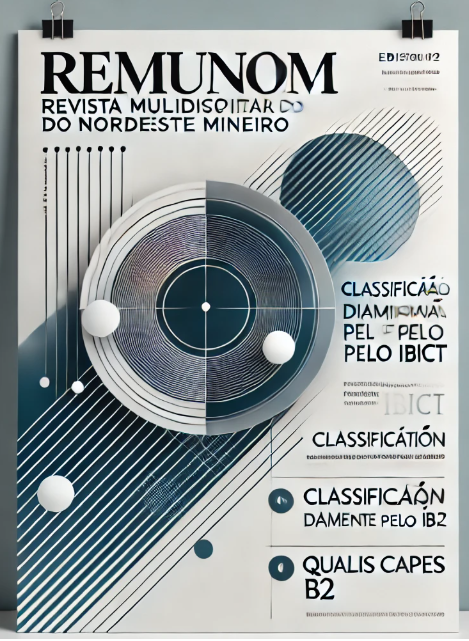SEQUÊNCIA DIDÁTICA COMO METODOLOGIA DE ENSINO NO PROCESSO DE ALFABETIZAÇÃO DE CRIANÇAS
DOI:
https://doi.org/10.61164/rmnm.v12i1.4189Keywords:
Literacy. Literacy. Teaching Methodologies. Didactic Sequence. Interdisciplinarity.Abstract
Abstract: The teaching sequence methodology has become a practice for many teachers in their daily classrooms, especially with regard to learning to read and write. Thus, this study investigates the teaching sequence as a teaching methodology in the process of teaching children to read and write. This is a bibliographic and field research, of a qualitative and exploratory nature, which sought to problematize the teaching sequence methodology in teaching and learning practices. To this end, interviews were conducted with seven teachers from the public school system in the municipality of Sooretama/ES, covering two schools of the initial years of elementary education. The research indicates that the teaching sequence methodology approach, in light of the interdisciplinary approach, promotes meaningful, interactive and contextualized learning in the reality in which children live, providing other experiences in the daily classroom. It also evidences pedagogical intentionality anchored in the dialogic and integrated perspective of knowledge construction.
Downloads
References
BRASI. Lei de Diretrizes e Bases da Educação Nacional. 7. ed. Brasília, DF : Senado Federal, 1996.
BRASIL. Ministério da Educação. Base Nacional Comum Curricular. Brasília: MEC, 2017. Disponível em: http://basenacionalcomum.mec.gov.br/. Acesso em: 25 mar. 2025.
CASTANHEIRA, Maria Lúcia. et al. Alfabetização e Letramento na Sala de Aula. 2. Ed. Belo Horizonte: Autêntica, 2009.
DOLZ, Joaquim; NOVERRAZ, Michele; SCHNEUWLY, Bernard. Sequências Didáticas para o oral e a escrita: apresentação de um procedimento. In: SCHNEUWLY, Bernard; DOLZ, Joaquim. Gêneros orais e escritos na escola. Campinas: Mercado de Letras, 2004. cap. 4. p. 95-128.
FAZENDA, Ivan Catarina Arantes. Interdisciplinaridade: História, teoria e pesquisa. 12. ed. Campinas: Papirus, 2017. Disponível em: https://www.everand.com/book/405795660 acesso em: 26 fev. 2025.
JESUS, Rosiane de Souza; SCHMITT, Valdineia. Et al. A importância da sequência didática na alfabetização e letramento. ISCI Revista Cientifica, Sinop/MT, a 2024. Disponível em: https://isciweb.com.br/revista/501-a-importancia-da-sequencia-didatica-na-alfabetizacao-e-letramento. Acesso em: 11 nov. 2024.
KUCYBALA, Fabíola dos Santos. Alfabetização e Letramento. Sagah Educação S.A., 2018. Disponível em: http://www.scribd.com/doc/551896420. Acesso em: 15 out. 2024.
LIBÂNEO, J. C. As teorias pedagógicas modernas revisitadas pelo debate contemporâneo na educação. In: LIBÂNEO, J. C.; SANTOS, A. (org). Educação na era do conhecimento em rede e transdisciplinaridade. Campinas: Alínea, 2012.
LOPES, Limerce Ferreira. (Org.). Práticas Interdisciplinares na Educação: diálogos, interfaces e desafios. 1. Ed. Goiânia: Editora Espaço Acadêmico, 2020.
NÓVOA, António. Formação de professores e profissão docente. In: NÓVOA, António (Org.). Os professores e sua formação. Lisboa: Dom Quixote, 1995.
OLIVEIRA, Maria Marly de. Formação Continuada de Professores: dialogando com Paulo Freire. Recife: Edupe, 2021.
SAVIANI, Demerval. Pedagogia histórico-crítica. 11 ed. Campinas: Autores Associados, 2011.
SOARES, Magda. Alfaletrar: toda criança pode aprender a ler e a escrever. São Paulo: Contexto, 2020.
SOARES, Magda. Alfabetização: A Questão dos Métodos. São Paulo: Contexto, 2016.
SOARES, Magda. Letramento: Um tema em três gêneros. 2. Ed. Belo Horizonte: Autêntica, 2006.
SOUSA, Ivan Vale de. Sequências Didáticas no Ensino de Línguas. Jundiai: Paco Editorial, 2018.
ZABALA, Antoni. A prática educativa: como ensinar. Porto Alegre: Artmed, 1998.
Downloads
Published
Issue
Section
License
Copyright (c) 2025 Revista Multidisciplinar do Nordeste Mineiro

This work is licensed under a Creative Commons Attribution-NonCommercial-ShareAlike 4.0 International License.
Autores que publicam nesta revista concordam com os seguintes termos:
- Autores mantém os direitos autorais e concedem à revista o direito de primeira publicação, com o trabalho simultaneamente licenciado sob a Licença Creative Commons Attribution que permite o compartilhamento do trabalho com reconhecimento da autoria e publicação inicial nesta revista;
- Autores têm autorização para assumir contratos adicionais separadamente, para distribuição não-exclusiva da versão do trabalho publicada nesta revista (ex.: publicar em repositório institucional ou como capítulo de livro), com reconhecimento de autoria e publicação inicial nesta revista, desde que adpatado ao template do repositório em questão;
- Autores têm permissão e são estimulados a publicar e distribuir seu trabalho online (ex.: em repositórios institucionais ou na sua página pessoal) a qualquer ponto antes ou durante o processo editorial, já que isso pode gerar alterações produtivas, bem como aumentar o impacto e a citação do trabalho publicado (Veja O Efeito do Acesso Livre).
- Os autores são responsáveis por inserir corretamente seus dados, incluindo nome, palavras-chave, resumos e demais informações, definindo assim a forma como desejam ser citados. Dessa forma, o corpo editorial da revista não se responsabiliza por eventuais erros ou inconsistências nesses registros.
POLÍTICA DE PRIVACIDADE
Os nomes e endereços informados nesta revista serão usados exclusivamente para os serviços prestados por esta publicação, não sendo disponibilizados para outras finalidades ou a terceiros.
Obs: todo o conteúdo do trabalho é de responsabilidade do autor e orientador.






